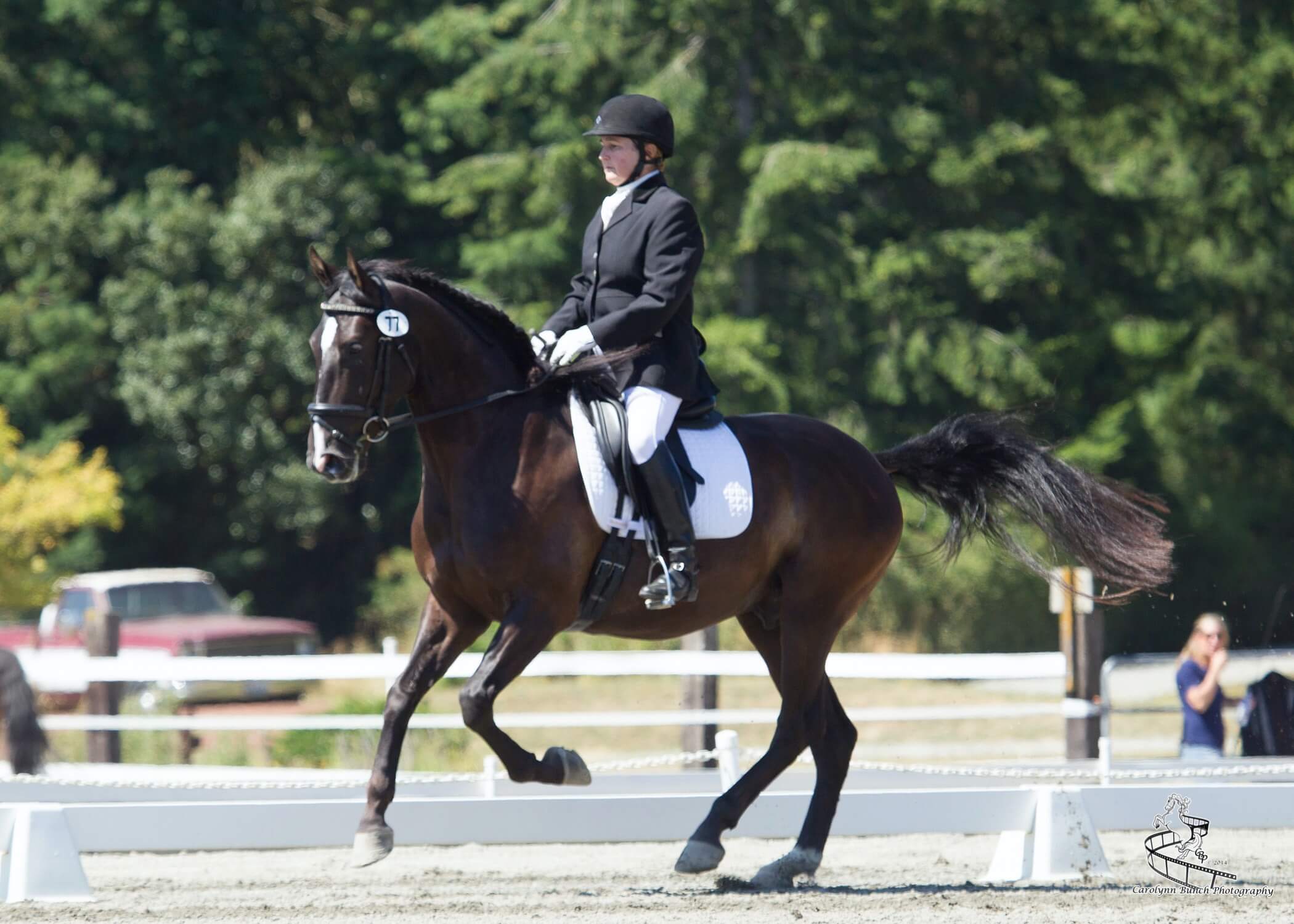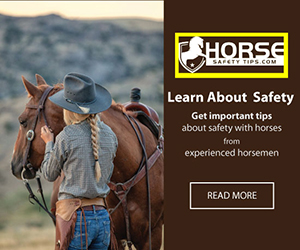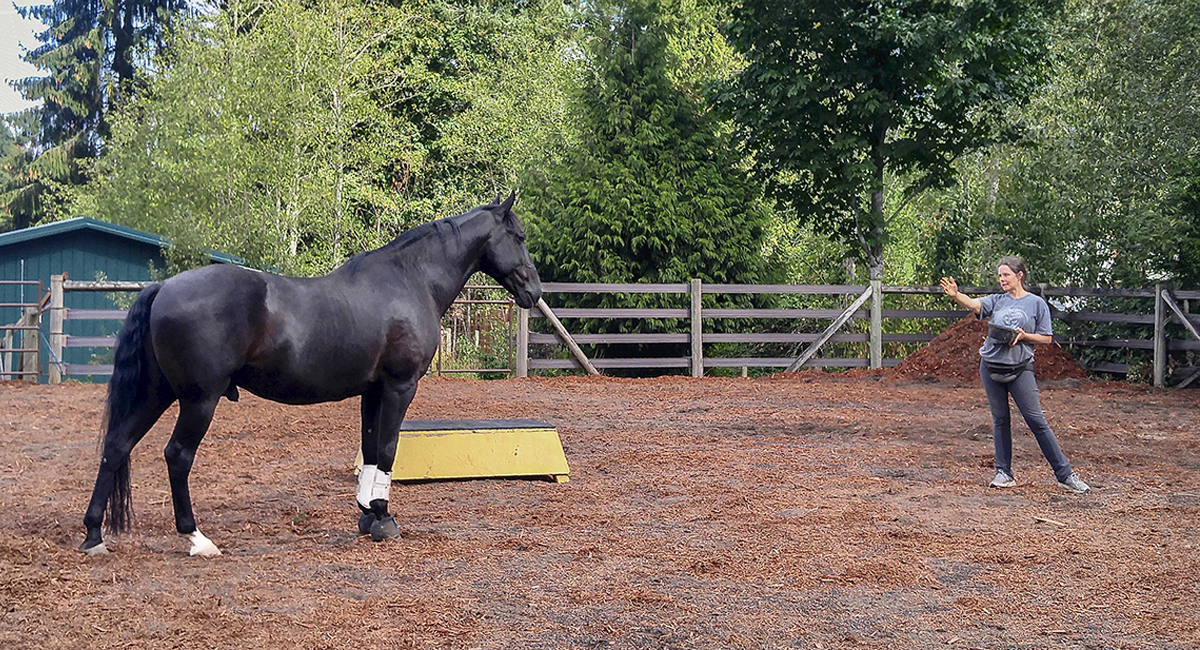How to Create an Easy-to-Catch Horse
One of the more satisfying moments in horse ownership is standing at a field gate, calling your horse, and have him break into a canter and come joyfully to you. By contrast, it’s frustrating to find yourself walking after a sour-faced horse who turns his rump in your direction and avoids being caught. What can we do to create the first scenario and not the second?
Here are three concepts to help you answer that question and develop a horse who will seek you out and make catching (and many other things) easier.
1. Make Your Horse Feel Safe
Recently I walked to the far side of my geldings’ field where I’d noticed they hadn’t been grazing. The horses followed me out and munched the lush grass while I stood with them. I noticed a pair of coyotes hanging out in the brush on the other side of the fence and realized my horses were avoiding this part of the field because the coyotes probably were living there. But with me in the field, the horses felt safe enough to stay and eat. When I left, the geldings followed me back and I felt good they trusted me to keep them safe.
Horses value safety above all else. As prey animals they are constantly on the alert for anything that might injure or kill them. Humans offer horses safety by demonstrating confidence and a lack of fear. We also need to show our horses we are aware of possible danger. I looked at the coyotes and wasn’t bothered, so the horses were calm.
Sometimes we carry fear we aren’t aware we have. It might even be our horses we fear, which confuses them, makes them scared (and perhaps even explosive), creating a cycle of fear with their handler. To offer our horses safety, we need to demonstrate calm self-assurance in situations where horses are fearful. Educating ourselves to be competent in handling horses helps us get control of our own fear and bring confidence to our horses.
2. Control Resources
Resources include food, water, shelter (from heat, bugs, sun, wind, rain), and companionship. Horses learn rather quickly that humans supply these comforts of life, and they will happily come with you if the result is receiving a cherished resource. If a horse refuses to be caught, but all his friends leave and go to the barn to get fed, watered, or escape the bugs, it won’t take long for that horse to figure out going with you is something he wants.
3. Create Connection
Horses are born naturally curious, and that leads to friendship and connection with humans if we use it to our advantage. As foals, horses seek us out and find that we provide a good scratch and perhaps some entertainment. Horses who are treated well as babies grow into trusting horses who are easy to catch. Those who are treated poorly never forget and it can be hard to regain their trust.
Horses enjoy learning (training) if we are fair and if the training brings rewards, praise, and physical well-being. Positive-based training, like clicker training, gives horses a sense of self-control that brings joy to the learning. Training that’s unfair, painful, or boring will often cause horses to avoid being caught. Occasionally catching your horse and just giving him a treat or a good grooming before turning him loose again can be a powerful way to “fix” a horse who doesn’t want to get caught.
One of the best ways I’ve found to create connection is similar to training a dog to stay and then come. Most dogs love to come to our open arms and praise. I teach my horses to “whoa” (or stay) on a spot at liberty and connect with me with their eyes and ears, holding the focus or eye contact as long as possible. In the beginning, food or treats can be used as a reward, but eventually it’s the connection itself that is the reward. Like a dog called from a sit/stay, when you release the horse from the whoa/stay they naturally come to you in a joyful way.
Remember, horses want to connect with us. If your horse is avoiding being caught, stop and think why this might be happening, look at yourself from your horse’s point of view, and take the time to teach your horse that a relationship with you is a wonderful thing.
See this article in the August 2024 online edition:
August 2024

Kim Roe grew up riding on the family ranch and competed in Western rail classes, trail horse, reining, working cow, and hunter/jumper. She trained her first horse for money at 12 years old, starting a pony for a neighbor.
Kim has been a professional dressage instructor in Washington state for over 30 years, training hundreds of horses and students through the levels. In recent years Kim has become involved in Working Equitation and is a small ‘r’ Working Equitation judge with WE United.
Kim is the editor of the Northwest Horse Source Magazine, and also a writer, photographer, and poet. She owns and manages Blue Gate Farm in Deming, Washington where she continues to be passionate about helping horses and riders in many disciplines.






